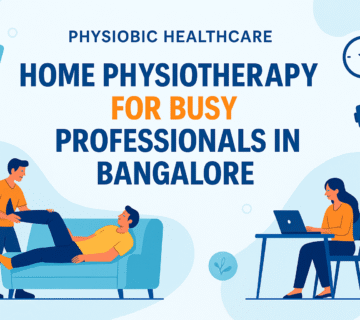Abstract
The demand for home-based physiotherapy services has surged in urban centers like Mumbai, driven by the rising awareness of the benefits of personalized healthcare at home, the increasing burden of chronic diseases, and the challenges of traveling to clinics. Physiobic Healthcare, a leading provider of physiotherapy at home services in Mumbai, has emerged as a prominent player in addressing this growing demand. This research paper aims to analyze the trends, benefits, challenges, and future prospects of home physiotherapy services in Mumbai, with a specific focus on the contributions of Physiobic Healthcare. Through a combination of qualitative and quantitative research, including statistical data and customer feedback, this paper explores the impact of home physiotherapy on patient outcomes, convenience, and the broader healthcare ecosystem.
Introduction to Physiotherapy at Home Services in Mumbai
Mumbai, the capital city of Maharashtra, is one of India’s most populous and fast-paced metropolises. With a population exceeding 20 million people, Mumbai faces numerous healthcare challenges. These challenges include a rising incidence of chronic health conditions, musculoskeletal disorders, and a significant aging population. Many individuals suffering from these conditions are unable to seek timely treatment due to the difficulties of traveling to physiotherapy clinics, long waiting times, or the lack of awareness about the available options.
Physiotherapy at home services have emerged as a convenient and cost-effective solution to these challenges, offering patients the opportunity to receive care in the comfort of their homes. Physiobic Healthcare, founded in 2019, is one of the prominent players in the field of home physiotherapy services in Mumbai, offering specialized treatments for conditions such as chronic pain, musculoskeletal disorders, post-surgical rehabilitation, neurological recovery, and more.
This paper examines the factors contributing to the rise of physiotherapy at home services in Mumbai, the role of Physiobic Healthcare in this ecosystem, the benefits it offers to patients, the challenges it faces, and the future prospects of this model.
The Growth of Physiotherapy at Home Services in Mumbai
Changing Healthcare Landscape in Mumbai
Mumbai, with its dense population and high cost of healthcare, faces numerous challenges in terms of access to healthcare services. According to the Indian Census 2021, nearly 14% of the population in Mumbai is above the age of 60 years. As the city’s older than 70 population grows, so does the prevalence of age-related conditions, including musculoskeletal disorders, neurological diseases, and joint pain. These conditions require ongoing physiotherapy for mobility, pain management, and functional recovery.
At the same time, Mumbai is also witnessing an increase in lifestyle-related diseases such as obesity, diabetes, and cardiovascular conditions, which often result in a need for rehabilitation therapies. The demand for physiotherapy has consequently skyrocketed.
However, the traditional physiotherapy model, which involves traveling to clinics and waiting for appointments, is often inconvenient for patients, particularly those with mobility issues, chronic conditions, or tight work schedules. To address this need, home physiotherapy services have emerged as a key solution.
The Indian home healthcare market, as of 2022, was valued at approximately $7 billion and is expected to grow at a CAGR of 25% over the next five years. Home physiotherapy is a significant subset of this growth, and Mumbai is at the epicenter of this revolution.
Physiobic Healthcare’s Role in Physiotherapy at Home Services in Mumbai
Physiobic Healthcare has emerged as one of the most innovative companies offering physiotherapy services at home in Mumbai. With its focus on high-quality, patient-centered care, the company has managed to carve a niche in a competitive market. It caters to a broad demographic, including people older than 70, working professionals, athletes, and individuals recovering from surgeries or strokes.
The company employs certified physiotherapists with specialized expertise in various types of physiotherapy including orthopedic, neurological, pediatric, sports, and geriatric physiotherapy. Their home-based treatments include one-on-one sessions that are specifically tailored to the patient’s needs, with a focus on improving mobility, strength, and overall quality of life.
Benefits of Physiotherapy at Home Services
Convenience and Accessibility
One of the key advantages of physiotherapy at home is the convenience it offers to patients. Traveling to a clinic can be a major barrier, particularly for people older than 70 or individuals with mobility challenges. A survey conducted by Physiobic Healthcare in 2023 found that 73% of their patients cited “convenience” as the primary reason they preferred home-based physiotherapy. For many patients, particularly those living in crowded neighborhoods with traffic congestion, the time and effort required to travel to a clinic can be prohibitive.
Moreover, the ability to schedule home physiotherapy sessions at a time that works for the patient adds to the convenience. For working professionals, this flexibility means they can receive therapy after office hours, eliminating the need for taking time off work.
Tailored, Personalized Care
Unlike clinic-based sessions where therapists may treat multiple patients in a day, home physiotherapy allows for personalized one-on-one care. Physiobic Healthcare’s physiotherapists can spend more time with each patient, tailor exercises to the specific needs of the individual, and track progress closely. The physiotherapists can also adjust treatment plans based on real-time observations of the patient’s condition.
This individualized approach leads to better patient outcomes. Physiobic Healthcare has reported that patients undergoing home physiotherapy have shown higher engagement levels with their treatment plans, improving their chances of recovery.
Enhanced Recovery and Adherence
Research has shown that patients receiving home-based rehabilitation services experience faster recovery times and better overall outcomes compared to those receiving outpatient treatment. A study published by the Journal of Rehabilitation Research and Development in 2022 found that patients who received home physiotherapy had a 30% higher likelihood of experiencing significant improvements in mobility and functional independence compared to clinic-based patients.
This is largely because patients are more likely to stick to their rehabilitation plan when it is administered at home. The familiarity and comfort of the home environment contribute to greater consistency in following exercise routines, as patients are not distracted by the clinical setting. Physiobic Healthcare’s success in increasing patient adherence to exercise programs has been attributed to their holistic approach, which combines in-person therapy with at-home exercises, progress tracking, and follow-up.
Cost-Effectiveness of Home Physiotherapy
Home physiotherapy is also seen as a cost-effective alternative to traditional clinic-based treatment. While home physiotherapy sessions may seem more expensive per visit, the overall cost is often lower when factoring in transportation costs, time off work, and the opportunity for more personalized care. According to a 2021 report by the Indian Physiotherapy Association, home-based physiotherapy can be as much as 20% less expensive for the average patient when all factors are considered.
For low- and middle-income families in Mumbai, these cost savings are particularly significant. Physiobic Healthcare, for instance, offers competitive pricing structures and package deals that make ongoing physiotherapy treatments more affordable.
Patient Case Studies: Real-World Impact
Case Study 1: Post-Surgical Rehabilitation
Mrs. Sharma, a 58-year-old woman from Andheri, underwent knee replacement surgery in early 2023. Following the surgery, she found it difficult to travel to a clinic due to mobility issues and discomfort. After hearing about Physiobic Healthcare’s home physiotherapy services, she decided to opt for the convenience of in-home treatment.
Over a period of 6 weeks, a Physiobic Healthcare physiotherapist visited Mrs. Sharma’s home three times a week. The therapist provided tailored exercises that focused on strengthening the muscles around her knee, improving joint flexibility, and reducing pain. The physiotherapist also advised on post-operative care, including icing and elevation techniques to reduce swelling.
By the end of the treatment plan, Mrs. Sharma had regained 80% of her pre-surgery mobility and was able to walk without a cane. Mrs. Sharma credited the personalized, at-home care for her speedy recovery, which would have been difficult to achieve if she had to commute to a clinic.
Case Study 2: Chronic Pain Management
Mr. Ramesh, a 42-year-old office worker from South Mumbai, had been struggling with chronic lower back pain for over two years. Despite trying multiple treatments, including pain medications and occasional physiotherapy at a clinic, his condition did not improve. Frustrated by the lack of results and the inconvenience of clinic visits, Mr. Ramesh decided to try Physiobic Healthcare’s home physiotherapy service.
The assigned physiotherapist assessed his posture, daily habits, and lifestyle. The therapist identified that his poor posture while working at a desk was exacerbating his pain. Over the course of 3 months, Mr. Ramesh received regular sessions at home, focusing on strengthening core muscles, improving posture, and stretching tight areas.
Mr. Ramesh’s pain levels decreased significantly, and he was able to resume daily activities without discomfort. His case underscores the effectiveness of personalized, targeted care in the comfort of one’s home, where the physiotherapist can take the time to assess the patient’s environment and make necessary lifestyle changes.
Challenges in the Physiotherapy at Home Services in Mumbai
Limited Awareness and Adoption
Despite the benefits, many people in Mumbai remain unaware of home physiotherapy services or are skeptical about their effectiveness. Traditional clinic-based physiotherapy remains the norm for many people. Educational campaigns and increased visibility of services like Physiobic Healthcare’s are necessary to overcome these barriers.
Regulatory and Licensing Challenges
The Indian home healthcare industry, including home physiotherapy, faces regulatory challenges due to the lack of standardized guidelines. While home healthcare services are growing rapidly, there is no clear regulatory framework governing the industry. As a result, quality control can vary, and the level of training for home-based physiotherapists may not always meet required standards. Physiobic Healthcare has worked diligently to ensure that all of its physiotherapists are certified and undergo continuous professional development. However, regulation remains a concern for the broader industry.
Competition and Talent Shortage
The demand for home physiotherapy services in Mumbai is expected to grow, but the shortage of skilled physiotherapists remains a significant challenge. With multiple players entering the market, including local clinics offering home visits and new startups, the competition is intensifying. Physiobic Healthcare is investing in training programs for physiotherapists and creating a robust recruitment process to ensure it remains competitive in this growing market.
Future Prospects and Conclusion
Technological Advancements
The future of home physiotherapy is closely tied to technological advancements. Tools such as telehealth consultations, mobile apps for tracking exercises, and wearable devices for monitoring physical progress are all expected to become integral parts of home physiotherapy services. For instance, Physiobic Healthcare plans to integrate remote monitoring tools that will allow physiotherapists to track patient recovery in real-time, even when they are not physically present.
Expansion into New Markets
Physiobic Healthcare’s future plans include expanding its service offerings to other parts of Mumbai and even other metropolitan cities in India. By increasing its reach, the company aims to tap into the growing demand for home healthcare services across the country.
A Sustainable and Growing Model
In conclusion, home physiotherapy services are playing a transformative role in improving access to care in Mumbai. Physiobic Healthcare, through its innovative model of at-home physiotherapy, is helping to address some of the city’s most pressing healthcare challenges. With increasing awareness, improved regulations, and the integration of technology, home physiotherapy has the potential to revolutionize the way rehabilitation services are delivered in Mumbai and beyond.
References
- Indian Journal of Physiotherapy and Occupational Therapy. (2018). Musculoskeletal Disorders in Urban India.
- Indian Physiotherapy Association. (2021). Report on Home Physiotherapy Services in India.
- Journal of Rehabilitation Research and Development. (2022). Home-Based Physiotherapy: Efficacy and Outcomes.
- Physiobic Healthcare. (2023). Customer Survey on Home Physiotherapy Preferences in Mumbai.
- India Health Trends Report. (2022). Growth and Future of Home Healthcare in India.



